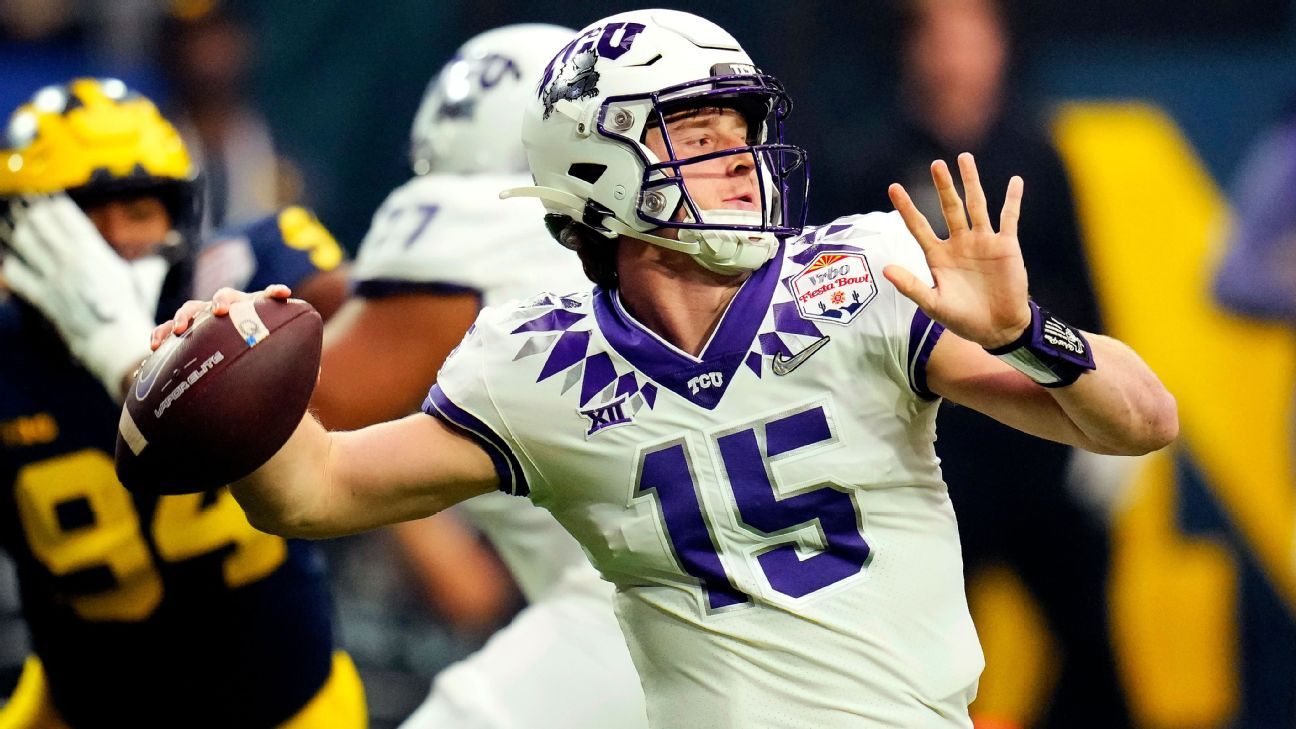FLORHAM PARK, N.J. — The New York Jets’ quarterback depth chart offers a juicy storyline on each tier, starting on top with Aaron Rodgers and his saga, followed by 2021 No. 2 overall pick Zach Wilson and his descent into quarterback purgatory. There’s room for one more arm, raising the possibility of a developmental prospect being picked in the NFL draft.
The Jets prefer to carry three quarterbacks on the roster because of the inherent value of the position. As coach Robert Saleh likes to say, “They’re like gold.” They certainly consider Rodgers a precious metal, which explains their willingness to wait out the Green Bay Packers on protracted trade talks. Presumably, he will be their quarterback of the present.
Wilson apparently will be the primary backup, with Saleh saying last week at the annual league meetings, “He’s our No. 2. I really still think Zach has a future in this league to be a really good quarterback, I really do. … We’re counting on him to be a fixture here for a while.” Wilson, demoted to third string last season, is only a sprained ankle away from the QB1 job — a scary proposition, based on the way he played last season (29th out of 33 in Total QBR among passers with at least 200 attempts).
The Jets could add another veteran as insurance — the way they did in 2021 and 2022 with Joe Flacco — or they could add a draft pick to the mix. If they bring in a rookie, it certainly would reinforce questions about whether Wilson remains a post-Rodgers option in 2024 or 2025. Naturally, it would depend on how high he’s drafted.
“We’ve seen these late-round quarterbacks go on to be lottery tickets in the sense that you never know what they can turn into,” ESPN draft analyst Jordan Reid said.
As they wait for Rodgers, the Jets have only two quarterbacks under contract — Wilson and Chris Streveler, a former practice squad member who played only 30 offensive snaps in 2022. Backup-turned-starter Mike White signed a free-agent contract with the Miami Dolphins and Flacco remains a free agent. The plan is to add Rodgers and another arm, if the right one comes along.
Which brings us to the draft.
“There’s no reason for you not to take a late-round quarterback this year even if your [Nos.] 1 and 2 are set,” Reid said.
In a seven-round mock draft for ESPN, Reid has 13 quarterbacks being selected. The last time it exceeded that was 2016, when 15 were picked, according to ESPN Stats & Information research. The record for most quarterbacks in a seven-round draft (since 1994) is 17, which happened in 2004 — the famous Eli Manning, Philip Rivers, Ben Roethlisberger draft.
No one is comparing the ’23 crop of quarterbacks to Manning & Co., but Reid anticipates another run because of two factors, both of which involve the San Francisco 49ers: The emergence of seventh-round pick Brock Purdy and the 49ers’ rash of injuries at the position, which caught up to them in the NFC Championship Game when Purdy hurt his throwing elbow.
Purdy was the last pick in the 2022 draft (No. 262 overall). The odds of finding another Purdy aren’t great, but Jets general manager Joe Douglas subscribes to the philosophy of former Packers GM Ron Wolf: If there’s an opportunity to add one, do it because quarterbacks are assets that can appreciate. Douglas has made two quarterback selections, James Morgan (2020, fourth round) and Wilson (2021, first round), neither of which has worked out.
Possible Day 3 options for the Jets:
Duggan is the “ideal” developmental prospect for the Jets, according to Reid. Duggan was a productive college passer (32 touchdowns in 2022) and runner who made strides at the Senior Bowl. Thompson-Robinson is intriguing because he’s a dual threat who showed significant improvement last season with his accuracy (69.6%). O’Connell reminds some of Mike White because, despite average arm strength, he has good size (6-foot-3), a quick release and good anticipation.
Not every draft expert loves this year’s quarterbacks, beyond the consensus top four: Bryce Young (Alabama), C.J. Stroud (Ohio State), Anthony Richardson (Florida) and Will Levis (Kentucky).
“I don’t like this Day 3 quarterback class very much at all,” ESPN draft analyst Matt Miller said. “There’s a drop-off, a significant drop-off from the top four, then Hendon Hooker (Tennessee), who maybe he deserves to be in the top five. But then I think you’re looking at a lot of projects.”
There has been some talk-show chatter about the possibility of the Jets taking a quarterback in the first round, but there’s no logic in that strategy. Assuming the Rodgers trade is finalized, the idea with the 13th pick would be to add a player who can help the 39-year-old star succeed now, not one who would eventually replace him.
If they don’t find a fit in the draft, the Jets can sign a veteran in free agency. We’re talking slim pickings, though — Flacco, Teddy Bridgewater and Carson Wentz are the most notable names available. Adding an experienced player would conform to the team’s win-now philosophy, providing additional insurance. That’s important to the Jets, who carried White and Flacco as backups last season.
The organization’s hope is that new offensive coordinator Nathaniel Hackett and new passing-game coordinator Todd Downing, the main voice in the quarterback room, will get Wilson’s career turned around to the point where he can be a reliable backup in 2023. They also would expect him to learn from Rodgers.
“If you have the right leadership in there, and a young guy has a chance to attach to that veteran’s hip, then it can only help him,” Saleh said.
Maybe there will be more than one young guy in the room.
